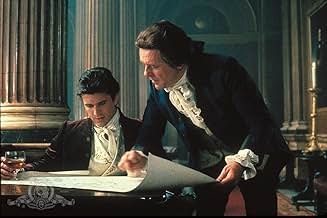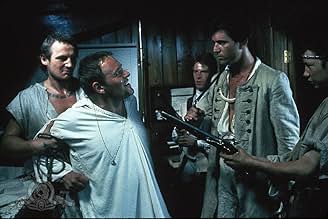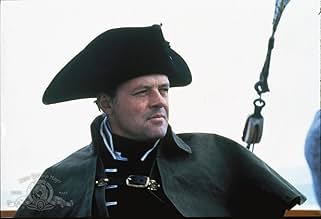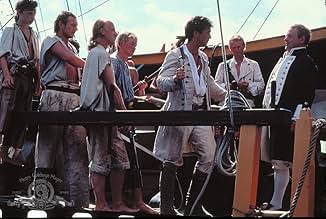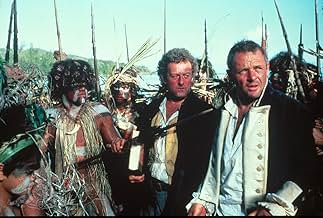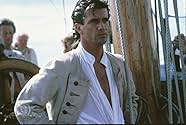La storia del tenente Bligh, la cui crudeltà porta a un ammutinamento sulla sua nave, la Bounty, guidata da Fletcher Christian. Entrambi gli uomini devono affrontare compiti ardui dopo l'amm... Leggi tuttoLa storia del tenente Bligh, la cui crudeltà porta a un ammutinamento sulla sua nave, la Bounty, guidata da Fletcher Christian. Entrambi gli uomini devono affrontare compiti ardui dopo l'ammutinamento.La storia del tenente Bligh, la cui crudeltà porta a un ammutinamento sulla sua nave, la Bounty, guidata da Fletcher Christian. Entrambi gli uomini devono affrontare compiti ardui dopo l'ammutinamento.
- Regia
- Sceneggiatura
- Star
- Premi
- 2 candidature totali
- Young
- (as Philip Davis)
Recensioni in evidenza
There have been many film treatments of this amazing story, but only "The Bounty" gets it even halfway right. The 1935 Lawton/Gable "Mutiny on the Bounty" is 49% balderdash and 51% falsehood. The Trevor Howard/Marlon Bando stinker is even less factual. "The Bounty", however is pretty good history in many places, especially Bligh's court-martial and the actual mutiny sequence, which is almost word-for-word what Bligh recorded in his own writings on the matter. The ship itself is correctly represented, right down to the figurehead a woman in a blue riding habit, which makes no sense until one realizes that HMAV Bounty was originally a merchant ship called the Bethia.
The movie does take liberties with history. Some characters are composites and some important figures are absent entirely. In the plot Bligh seeks out Christian to be his second officer. In reality Christian was a friend of Bligh's wife's family, and it was he who sought a posting on Bounty; Bligh didn't solicit his participation. In fact Bligh jiggered the ship's roster to make room for Christian.
But the worst departure from fact is the business about Cape Horn and circumnavigation. The movie wants us to believe that Bligh chose the route for his own glory. Not true. Bligh complained to the Admiralty about the chosen course before they set sail from England, thinking it too dangerous for such a small vessel. But he was overruled. The return trip was never intended to go by way of Cape Horn. The cargo was breadfruit seedlings, a tropical plant that can't endure the kind of temperatures encountered in the Drake Passage or the Straits of Magellan. Bligh was forbidden to return via this route. Even if he wanted to such a course of action would have ruined his career. Also the mutiny occurred near Tofua, about 1300 miles west of Tahiti, the wrong direction to sail if you're bound for Cape Horn.
Bligh was a man and a professional. Christian was a silly, overwrought upper class schoolboy who committed a vile crime over puppy love of a Polynesian girl. He got away with attempted mass murder, and 200 years later people still praise him. Bligh was a true hero who hasn't got justice yet.
Bligh was a very good seaman, an excellent navigator, and a firm but fair ship's captain. There were far worse than him in the Royal Navy. His 3,500+ mile voyage in a small open boat with his loyal crew members has never been bettered.
After the slander of the two previous films in the 30's and 60's, this film gives a far more accurate and sympathetic portrayal of Bligh, and Anthony Hopkins is excellent as always.
This is filled with great actors. They are all good. The older versions have Bligh as the villain and Christian as the hero. This one isn't quite so simplistic. Christian is more of a blank for the most part while Bligh tries to be sympathetic as much as he's allowed. Hopkins isn't doing a crazed dictator as usual but a needy outsider. I'm not sure about the constant back and forth between the time periods. The later time period adds very little to the movie. It is far too long already. The movie needs to get to Tahiti earlier. The turn in Tahiti is terrific with Hopkins finding another gear. The film looks beautiful. If Roger Donaldson could push the pace more and reduce the over 2 hour running time, this could be an even better film.
Mel Gibson plays Fletcher Christian who must watch helplessly as his captain(Hopkins) demoralizes his men and drives them ever closer to the brink of mutiny. The tension builds throughout the film and in no small part to the excellent score. The disgruntled crew has many recognisable faces including Liam Neeson and Bernard Hill which makes the film all the more enjoyable. Daniel Day Lewis is particularly watchable as mr. frier, showing us a rather smug and sometimes fiery officer. The film is shot beautifully and the story is compelling. Even the script holds up in a film where the best performances come from the actors with the least to say.
So, for its historical rendering, "The Bounty" excels. Many of these details are not covered, or are skimmed over in the more popular movies. For instance, Bligh was a Royal Navy Lieutenant - not a captain. Bligh was the only navy man and only actual officer on board. Christian was not a first lieutenant, but a master. He and all the rest of the leaders of the crew had the ranks of noncommissioned officers and came from the merchant marine. Christian was a known friend of Bligh's before the voyage. Bligh's first mate had already been chosen, so Christian signed on as junior to him. But, Bligh later removed the other mate, Fryer, and put Christian in his place.
Bligh was an accomplished and skilled naval officer. He had served under Captain Cook on his third voyage to the South Pacific, so he alone knew the area and Tahiti. Bligh was not the fierce commander who doled out heavy physical punishment. He was more lenient than most captains in that regard. But, he had a temper, and made many verbal miscues as an officer. All of these things and many more facts of the true story are in this film. It is an excellent account of the voyage of the HMS Bounty, the mutiny, the successful 3,500-mile sea voyage of Bligh and his loyalists on a small boat, and the plight of the mutineers.
So, why then is it not the best, the favorite of all the movies? I think it's because the characters of the other films were much more interesting. Look at the 1935 film, for instance. Charles Laughton was outstanding as a fierce, fear-inspiring captain. Clark Gable was much more interesting as the flamboyant officer and dashing ladies' man. And, then there's the amount of time spent on so much of the factual details. I think the 1984 film spent far too much time covering the five-month layover on Tahiti. The sailing scenes were better and more interesting in the earlier films.
The performances in "The Bounty" were all very good. But, the screenwriters needed to do something to make the leads more interesting - especially Christian and Fryer. There were a couple of excellent supporting performances in this movie. Most notable was that by Liam Neeson as Seaman Charles Churchill. I am among those who find the 1935 Bounty with Laughton and Gable the most exciting and entertaining. I think that drives home a good point that people should not rely too much on movies for accurate history. A movie like the 1935 film can entertain by playing loose with or not including many of the facts or true aspects of the story. And, it can wet one's appetite for history. But, we need then to check the true story in the Encyclopedia Britannica or other sound historical sources.
I thought viewers might be interested in some more facts. Although it had three masts, the Bounty was quite small as could be seen in the early loading scenes. It was only 90 feet long, 24 feet wide, and displaced a mere 230 tons. It had a crew of one officer and 45 men. Compare that to a Man-Of-War, the types of ships we have seen in some of the great naval movies and swashbucklers. For instance, Lord Nelson's ship at the Battle of Trafalgar in 1805 (just 15 years after the Bounty mutiny) displaced 3,500 tons. It had three masts, each with three to four sails (some as long as 200 feet), and measured 227 feet long and 52 feet wide. It carried a crew of 850 men - nearly 20 times the size of the Bounty's crew. And, it had 104 canons; 4 in the bow, 8 astern, and 56 each aligned on three gun decks on each side. It could make 8 to 9 knots an hour - about 10 miles per hour.
The HMS Victory is still in service as the flagship of the Royal Navy Fleet Admiral at Portsmouth, England. MGM used existing sailing ships for its 1935 film to represent the Bounty and the Pandora. Fewer tall ships existed by 1962, and MGM built a replica for its film that year with Marlon Brando. After the movie it sailed around the world as a tourist attraction, but sank off the coast of North Carolina after the crew abandoned it during a hurricane in 2012. Another replica was made for this 1984 film, and today it serves as a tourist boat in Honk Kong Harbor. In 1957, divers from National Geographic discovered the ruins of the Bounty at Pitcairn Island. And, that island today has about 56 residents, descendants of the Bounty mutineers and the Tahitians who went with them.
Lo sapevi?
- QuizMel Gibson was disappointed with his performance and the finished movie. He later said of the movie, "I think the main problem with that film was that it tried to be a fresh look at the dynamic of the mutiny situation, but didn't go far enough. In the old version, Captain Bligh was the bad guy and Fletcher Christian was the good guy. But really Fletcher Christian was a social climber and an opportunist. They should have made him the bad guy, which indeed he was. He ended up setting all these people adrift to die, without any real justification. Maybe he'd gone island crazy. They should have painted it that way. But they wanted to exonerate Captain Bligh while still having the dynamic where the guy was mutinying for the good of the crew. It didn't quite work."
- BlooperWhen Bligh, Fryer and Christian are in Bligh's home planning the voyage, Bligh refers to a route that would take them around the coast of 'Australia'. But at the time of the Bounty's voyage in 1789 what we now know as Australia was instead universally called New Holland - a name which also appears on Bligh's map and which he later uses after being cast adrift. 'Australia' only came into common usage in the early 19th century; it gained official status in 1824.
- Citazioni
Lt. William Bligh: We are still faced with a long, hard voyage. I mean to make good use of every hour of sailing time, and to assist me in this, I am replacing Mr. Fryer with Mr. Christian, who will now act as executive second in command, with the rank of Acting Second Lieutenant...
[Fryer walks away]
Lt. William Bligh: Mr. Fryer, come back here.
[shouts after Mr. Fryer, who is continuing to walk away]
Lt. William Bligh: Mr. Fryer, sir! Come back here!
[Mr. Fryer returns; Bligh continues, quietly]
Lt. William Bligh: I will dismiss when I have done with you, sir. Do you hear me?
John Fryer: This is an outrage!
Lt. William Bligh: Mr. Fryer!
John Fryer: In all my years at sea...
Lt. William Bligh: Your "years at sea"? Good Lord, man! If I'd known your nature, I would not have accepted you as boatswain of a river barge.
John Fryer: Must I suffer this before the men?
Lt. William Bligh: You will suffer my correction whenever you're at fault, sir!
John Fryer: What fault?
Lt. William Bligh: [shouts] God damn your eyes, man! You turned your back on me!
John Fryer: Well for that, I apologize.
Lt. William Bligh: Very well.
John Fryer: But I protest.
Lt. William Bligh: You protest, do you?
John Fryer: I am Master of the Bounty!
Lt. William Bligh: [shouts] And I, sir, am *Commander*! By law! I am the first! Do you understand? God damn your hide! And now you may dismiss, sir!
- Versioni alternativeGerman version misses ca. 26 minutes.
- ConnessioniFeatured in The Making of 'The Bounty' (1984)
I più visti
Dettagli
Botteghino
- Budget
- 25.000.000 USD (previsto)
- Lordo Stati Uniti e Canada
- 8.613.462 USD
- Fine settimana di apertura Stati Uniti e Canada
- 2.622.306 USD
- 6 mag 1984
- Lordo in tutto il mondo
- 8.613.462 USD
- Tempo di esecuzione
- 2h 12min(132 min)
- Colore
- Mix di suoni
- Proporzioni
- 2.39 : 1


